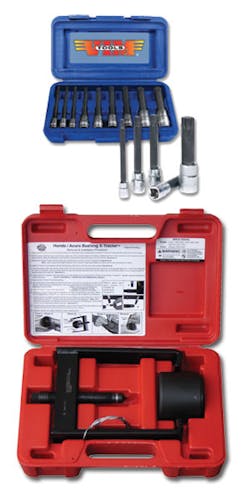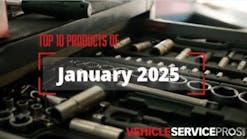How do you sell specialty tools? Do you have a selection of them on your truck and hope that techs that need a particular one happen across it for an impulse buy? Do you pay attention to what your techs are talking about and pick up tools to fit those needs? Or do you just wait to be asked and then thumb through catalogs to do a special order?
Do you keep up on the continual advance of specialty tools and their impact in the repair bay? Can you drive your Honda techs to the Bushing X-Tractor that will save them more than an hour of Honda “book” time that eliminates the need to disconnect several brake parts during the job? Do you know which companies are making sockets and drives to ease repairs on German vehicles, or which new tools will help with Ford or GM work?
As you know, it is a bit different selling specialty tools than selling a socket set or impact tool. We asked several techs what they look for in specialty tools they purchase. Responses online at the PTEN.com blog showed most techs want a good return on investment, especially for a tool they typically will use on an infrequent basis. After ROI, they’re keen on USA-made quality products and then price.
Some of the comments from techs on the PTEN.com blog included:
“ROI is important, but quality ranks number two,” said tech Chris Hanrahan. “If I’m going to shell out big money for a three-times-a-year tool, it had better last longer than one year. Price is up [important], but ease-of-use is also [key].”
Tech Harry Zier also put ROI and quality at the top of his list.
“I look more at the quality of the specialty tool rather than its brand name. ... When buying specialty tools, I always balance the price of the given tool with what the tool will enable me to accomplish,” said Zier. “How much time will the tool save me, how much easier will the tool make my work, and how often will I actually use it are key for me in deciding to buy it or not.”
Tech Michael Hevner concentrates more on quality than anything else with specialty tools and any other tools he buys.
“I refuse to buy junk from Harbor Freight or similar vendors. While price is important, quality is even more important, as is warranty. If the specialty tool I buy has a lifetime warranty but is three-times the price or more of a tool with a limited warranty (or no warranty) I would probably still buy the more expensive tool. I don’t need it to break in the middle of an operation and leave me scrambling for an alternative,” Hevner said. “It isn’t worth getting hurt or having your reputation suffer because of a tool issue. Do it once do it right.”
Quality and “Made in the USA” are key to top tech Chester Wasko Jr., who also makes some of his own specialty tools.
“When I buy specialty tools I always look for the ‘Made in USA’ on the label from a reputable manufacturer … I look at the people I am putting to work by buying USA versus foreign,” Wasko said. “I do end up making some of my tools, since some specialty tools are not readily available; but even then I will go for the best quality tool to cut up so that the new tool, that I make, will last longer and be safer to use.”
Along with a focus on quality, some tech’s, like Mike Larson, also key in on price. “Quality is very important to me when choosing a specialty tool. … For tools I use most frequently I will search the net, etc., for the best quality lowest price version.”
If you’re smart about specialty tools sales, then you’re keeping up on what’s available, what your techs need and what’s on your truck. They want specialty tools that save time and won’t break, and most techs are willing to pay for those conveniences.


